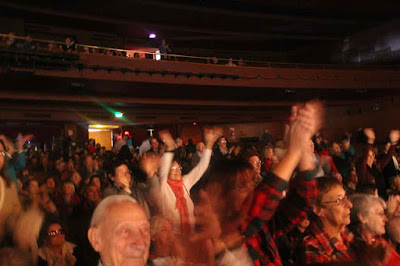Dr. Eric Conway:
Day 8 of our tour began with a plane ride back to Buenos
Aires, our arrival city. We departed from the hotel at 8AM for the
Mendoza airport. We had a short 90 minute flight back to Buenos Aires,
which would have taken 13 hours to return by bus. Buenos Aires is the
largest city in Argentina and 2nd largest city in South America at
thirteen million in population. The runway to the airport is next to
the Rio de la Plata which gave a spectacular view upon landing.
Once
again, all of our luggage made it back from Mendoza to Buenos Aires.
Our guide is from Buenos Aires, so he was very enthusiastic about
sharing the details of his hometown. Our first tourist attraction of
the city was a graveyard called Cementerio de la Recoleta. This place
is called the city of the Dead. At first the idea of visiting a
graveyard did not sound too pleasing, however, once there, we all
believed that it was one of the most fascinating places that one could
visit. There were close to 4,700 grave sites at this cemetery. Every
gravesite was a mausoleum, i.e. above ground. No two mausoleums were
the same. This is the place where presidents, military generals,
founding families of the city are buried. We even visited the gravesite
of Eva Peron of "Evita" fame. These mausoleums featured small rooms
where one's family could spend private time with their dearly departed.
A typical mausoleum could store as many as thirty bodies. Families
paid annual taxes on the real estate of their plot at this site. As you
can imagine, it was very expensive to purchase and maintain these grave
sites.
After the
Cemeterio de la Recoleta, we went to a leather factory, where we all
marveled at the vast selection of leather goods in the store. The
prices were not bargain basement by any means, but were very reasonable
for the quality. I did try on a leather vest and pair of pants,
however, I do no believe I can legitimately wear a pair or leather
pants!
After the
visit to the leather factory, we visited the Metropolitan Cathedral
which housed the tomb of the national hero José San Martin. We then
checked into the hotel. We had a big evening planned in Buenos Aires,
as we took in a Tango show after dinner. The dancing and singing were
very good. See YouTube link to some video footage that I captured
below! https://www.youtube.com/watch?v=8xWVeoqodlM
On
Day 9 we had our last concert at the Gran Rex Theatre with a seating
capacity of 3,300. I was very concerned that our 1PM Thursday afternoon
concert would not have much of an audience, given this did not seem
like a regular concert time, however, this is a very well-known series
that typically had large audiences. Our concert was sponsored by the
Mozarteum, the top arts organization in all of Argentina. This series
is a free concert series for the people of Argentina. The hall was very
beautiful. Although it did not seem much larger than Murphy Find Arts
Center at Morgan, it was clearly larger with balconies that were quite
deep and high. Before the concert, the lines of persons waiting to see
the concert wrapped around the building. This was a fitting venue for
our last concert. Most attendees were either persons who were retired
or persons who worked in the area to attend during their lunch/siesta
break.
I was given
orders from stage manager to begin 1:00 PM sharp! I was told the
official attendance of our concert was over 900, which is not bad for a
Thursday afternoon. Our concert was approximately one hour. Again, we
had another appreciative audience, who despite our efforts to leave the
stage, called us back for an encore. After the concert, much like all of
the other concerts of this tour, many persons stayed behind to
personally congratulate the choir for their efforts.
After
the concert, Hernan our guide, took us to La Boca, which was the city's
first port and an African slave colony before immigrants settled here
in the 1880's. La Boca is one of the city's poorest neighborhoods and
still where most if any of the Afro-Argentinians live. During our stay
in Argentina we noticed very few persons of African descant. We were
told by our guide that cholera and yellow fever epidemics virtually
killed the entire African population in the 19th century. We are told
from others, that at some point during the history of Argentina, many of
the Blacks were exported from the country to retain an ethnically pure
race. Does this sound familiar? Probably, both are true to some
extant, and depends on who is telling the story for their perspective.
At the end of the day, one noticed very few persons in Argentina from
the African diaspora. That may be the reason why our HBCU choir and
music is such a novelty in this country.
Tonight, we will enjoy a group dinner and overnight in Buenos Aires!
See some YouTube links to our San Luis concert:
Water Night
A Boy and a Girl
Gracias a La Vida
EC









No comments:
Post a Comment